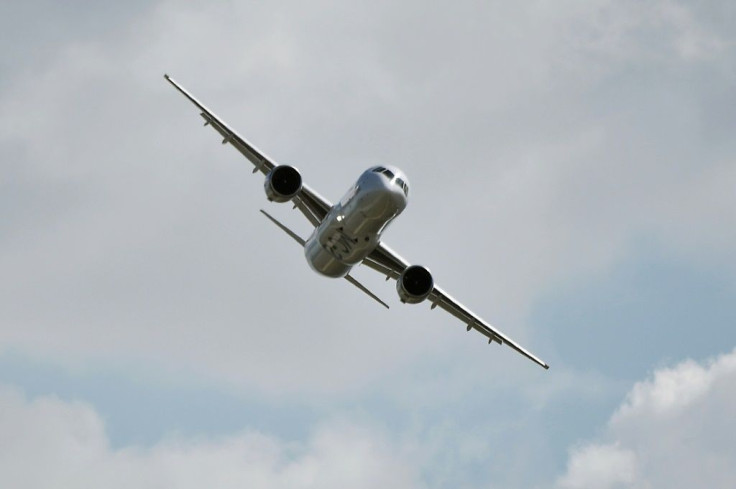Russia aims high with new passenger plane

Russia on Wednesday unveiled to clients its new MC-21 passenger plane, billed as a competitor to Boeing and Airbus even though the project has been stymied by sanctions and glitches with its predecessor, the Sukhoi Superjet.
The new plane was the showpiece at the MAKS air show outside Moscow, which President Vladimir Putin formally opened on Tuesday with Turkish counterpart Recep Tayyip Erdogan.
It took to the air to perform for potential customers after more than a decade in production hampered by multiple delays.
Produced by Siberia-based manufacturer Irkut, the medium-haul plane seats up to 211 passengers and has a range of 6,000 kilometres (3,730 miles) -- enough to take it from Moscow to any European destination.
It is the Russian aviation industry's big hope after setbacks with the regional Sukhoi Superjet 100 liner, launched in 2011 as the first post-Soviet civilian airplane.
"We have achieved several agreements on MC-21 during this forum", said Ravil Khakimov, the head of Irkut, without giving details.
Irkut says on its website that it has signed hard contracts for 175 planes already, listing mostly Russian airlines as clients.
The plane's catalogue price will be cheaper than its direct competitors in the medium-haul range, Khakimov promised.
The MC-21 "is set to compete on the market with Airbus 320 and Boeing 737," said Oleg Panteleyev, an aviation analyst who heads industry website Aviaport.ru.
Putin at the opening lauded Russia's aircraft manufacturers for "breakthrough projects" such as the MC-21, and described the country as "among the flagships of the global aerospace industry".
The air show is the first since Russia's United Aircraft Corporation (UAC), a conglomerate of civilian and military aircraft makers including Irkut, was put in the hands of state-owned corporation Rostec last year.
Wings clipped by sanctions
An MC-21 prototype made its maiden flight in 2017 but serial manufacturing was delayed, partly due to US sanctions that affected the production of its carbon composite wings.
Though it was supposed to be put in service at the end of 2018, Rostec chief Sergei Chemezov said this year the first MC-21 planes would be delivered to Russian state-owned Aeroflot airline only in 2021.
"All the deliveries will start in the second half of 2021," said Irkut chief Khakimov.
The aircraft manufacturer has a production target of 72 planes a year, said the MC-21's chief designer Konstantin Popovich.
The first batch of the aircraft were equipped with US-made Pratt & Whitney engines, but sanctions blocked further deliveries.
The three planes on display at Wednesday's air show have the American engines, but future production will use Russian-made PD-14 engines.
Sanctions against Moscow, gradually introduced since 2014, when Russia annexed Crimea from Ukraine, have hit several Russian industries, and Rostec and Chemezov were put on the US Treasury's sectoral sanctions blacklists.
Buyer 'fears'
While military aircraft makers are financially supported by the Russian airforce, which has been ordering new planes in recent years, the main hurdle for Russia-made civilian aircraft is finding foreign clients, said aviation analyst Panteleyev.
"They have to compete with foreign manufacturers, which have much larger scope for promoting their planes," he said.
Irkut's chief designer and first deputy director Oleg Demchenko named Latin America, the Middle East and Southeast Asia as target markets for the MC-21.
Russia's first post-Soviet passenger jet, the Sukhoi Superjet-100, was initially well received, but many clients later backed out due to difficulty servicing it and getting parts replaced.
Several accidents have also contributed to a poor image for the plane, most recently in May, when 41 people died in a fire after one crash-landed in Moscow. The investigation into the accident is ongoing.
The Superjet has minor problems that could be fixed with continued investment, but "because so few planes were sold, they can't get enough money from turnover for this work", Panteleyev said.
At the outset, the Superjet had aimed to capture 20 percent of the market for regional planes, but is now mostly used by state-owned Aeroflot.
"Everyone is aware there is a risk" of the Superjet's troubles casting a shadow on the MC-21, Panteleyev said.
"They will do everything possible to soothe the fears of potential buyers."
© Copyright AFP 2024. All rights reserved.





















